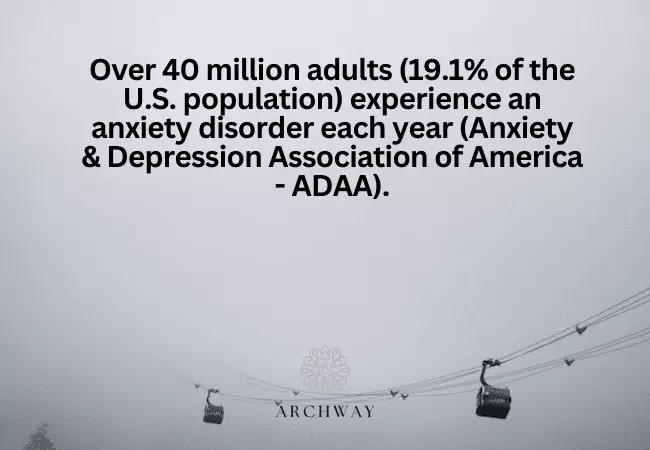Anxiety disorders are among the most common mental health conditions in the U.S., affecting over 40 million adults each year (Anxiety & Depression Association of America – ADAA). While occasional anxiety is a normal response to stress, persistent, overwhelming, and uncontrollable anxiety can interfere with daily life, relationships, and overall well-being.
For individuals struggling with generalized anxiety disorder (GAD), panic disorder, social anxiety, or other anxiety-related conditions, seeking treatment at a reputable Mental Health Treatment Center is a vital step toward regaining stability and improving quality of life. At Archway Behavioral Health, we provide evidence-based mental health treatment services tailored to each individual’s needs, including Cognitive Behavioral Therapy (CBT), Dialectical Behavioral Therapy (DBT), Individual Therapy, and Group Therapy Programs.
In this guide, we’ll explore:
- Signs that professional anxiety treatment is needed
- Different levels of anxiety treatment programs
- Therapies used in reputable Anxiety Treatment Programs
- How to choose the best Mental Health Treatment Center in Florida
- Steps to start your recovery journey
Recognizing When Anxiety Requires Professional Treatment
Anxiety disorders can be debilitating when left untreated, leading to severe emotional, physical, and cognitive distress.
Common Signs of an Anxiety Disorder
- Persistent excessive worry or racing thoughts
- Increased irritability and restlessness
- Panic attacks with shortness of breath, chest pain, dizziness, or sweating
- Sleep disturbances, including insomnia or frequent nightmares
- Avoidance behaviors, such as skipping work, school, or social activities
- Unexplained headaches, muscle tension, nausea, or digestive issues
- Difficulty concentrating or making decisions
If anxiety is interfering with daily life, causing physical symptoms, or leading to avoidance behaviors, professional treatment may be necessary.
Levels of Care in an Anxiety Treatment Program
Treatment for anxiety disorders varies depending on severity, individual needs, and previous treatment history. At Archway Behavioral Health, we offer multiple levels of care, ensuring that individuals receive the appropriate support at every stage of recovery.
1. Inpatient/Residential Anxiety Treatment
- 24/7 supervision and structured care in a controlled setting.
- Ideal for individuals with severe anxiety, panic disorders, or co-occurring mental health conditions.
- Includes intensive therapy, medication management, and holistic wellness programs.
2. Partial Hospitalization Program (PHP)
- A structured program with full-day therapy sessions while allowing individuals to return home in the evening.
- Ideal for individuals transitioning from inpatient care or those requiring a higher level of support than outpatient therapy.
3. Intensive Outpatient Program (IOP)
- Flexible therapy sessions multiple times a week, allowing individuals to maintain daily responsibilities.
- Focuses on relapse prevention, coping strategies, and emotional regulation.
- Incorporates Cognitive Behavioral Therapy (CBT), Dialectical Behavioral Therapy (DBT), Individual Therapy, and Group Therapy Programs.
4. Outpatient Therapy
- Weekly or biweekly therapy sessions for continued support.
- Ideal for individuals with mild-to-moderate anxiety symptoms who have completed more intensive programs.
At Archway Behavioral Health, we help individuals navigate their anxiety recovery journey by recommending the appropriate level of care based on their specific needs.
Evidence-Based Therapies Used in Anxiety Treatment
A reputable Mental Health Treatment Center should use scientifically validated treatment methods to help individuals gain control over their anxiety. At Archway Behavioral Health, we offer proven, research-backed therapies that empower individuals to manage anxiety symptoms effectively.
1. Cognitive Behavioral Therapy (CBT): Reshaping Thought Patterns
CBT is one of the most effective therapies for anxiety disorders, focusing on:
- Identifying negative thought patterns that contribute to anxiety.
- Replacing irrational fears with realistic perspectives.
- Teaching practical coping strategies to manage worry and panic attacks.
Studies show that CBT can reduce anxiety symptoms by 60-80% when combined with structured treatment programs (Journal of Clinical Psychology).
2. Dialectical Behavioral Therapy (DBT): Emotional Regulation and Distress Tolerance
DBT is particularly beneficial for individuals with high emotional sensitivity and panic-related anxiety. It focuses on:
- Mindfulness techniques to stay present and reduce rumination.
- Distress tolerance skills to manage intense anxiety without avoidance behaviors.
- Emotional regulation exercises to develop long-term coping mechanisms.
DBT is widely used for individuals with co-occurring anxiety and mood disorders.
3. Individual Therapy for Personalized Care
One-on-one therapy sessions help individuals:
- Process past traumas and stressors contributing to anxiety.
- Develop customized coping skills to manage anxiety triggers.
- Build confidence in navigating life challenges.
At Archway Behavioral Health, our therapists provide personalized care tailored to each individual’s unique needs.
4. Group Therapy Programs: Peer Support and Shared Healing
Group therapy offers a supportive community where individuals can connect with others facing similar struggles. It helps by:
- Reducing feelings of isolation and shame.
- Teaching social skills and stress management techniques.
- Providing shared coping strategies from peers and therapists.
Studies show that Group Therapy improves anxiety symptoms by over 30%, making it an essential part of comprehensive treatment (American Group Psychotherapy Association – AGPA).
Choosing the Best Anxiety Treatment Center in Florida
Not all Mental Health Treatment Centers provide the same level of care. When selecting a reputable Anxiety Treatment Program, consider the following:
1. Does the facility use evidence-based therapies?
Look for programs that offer CBT, DBT, and other scientifically validated treatments.
2. Is the treatment customized to individual needs?
The best centers provide personalized treatment plans, addressing specific triggers, co-occurring conditions, and recovery goals.
3. Are licensed mental health professionals available?
Ensure the center has board-certified psychiatrists, licensed therapists, and experienced mental health professionals.
4. Is there a structured aftercare program?
Recovery doesn’t end after treatment—choose a center that offers long-term support through outpatient therapy and follow-up care.
At Archway Behavioral Health, we are committed to providing high-quality, evidence-based anxiety treatment programs designed to support long-term recovery.
Conclusion
If anxiety is interfering with your daily life, relationships, or overall well-being, seeking professional treatment is the first step toward healing. At Archway Behavioral Health, we offer personalized, compassionate, and effective anxiety treatment programs to help individuals reclaim control of their mental health.
Get Started Today:
- Call Archway Behavioral Health at 888.488.4103 for a confidential consultation.
- Schedule an assessment to determine the best treatment approach.
- Take the first step toward a calmer, more fulfilling life.
Anxiety does not have to control your life—help is available, and recovery is possible. Let Archway Behavioral Health guide you toward lasting relief.
Frequently Asked Questions (FAQ)
What is an Anxiety Treatment Program?
An Anxiety Treatment Program is a structured mental health program designed to help individuals manage and reduce anxiety symptoms through evidence-based therapies like Cognitive Behavioral Therapy (CBT), Dialectical Behavioral Therapy (DBT), Individual Therapy, and Group Therapy Programs.
How do I know if I need professional anxiety treatment?
You may need professional anxiety treatment if you:
- Experience persistent, excessive worry that interferes with daily life.
- Have panic attacks or overwhelming physical symptoms like racing heart, sweating, or dizziness.
- Avoid work, school, or social activities due to fear or anxiety.
- Struggle with insomnia, restlessness, or difficulty concentrating.
- Have tried self-help strategies without success.
What types of anxiety disorders are treated at Archway Behavioral Health?
We provide treatment for a range of anxiety disorders, including:
- Generalized Anxiety Disorder (GAD)
- Panic Disorder
- Social Anxiety Disorder
- Obsessive-Compulsive Disorder (OCD)
- Post-Traumatic Stress Disorder (PTSD)
- Specific Phobias
What therapy approaches are used to treat anxiety?
At Archway Behavioral Health, we use scientifically validated therapies, including:
- Cognitive Behavioral Therapy (CBT) to identify and change negative thought patterns.
- Dialectical Behavioral Therapy (DBT) to improve emotional regulation and distress tolerance.
- Individual Therapy for personalized support and coping strategies.
- Group Therapy Programs to build social skills and reduce isolation.
What levels of care are available for anxiety treatment?
We offer multiple levels of care based on individual needs:
- Inpatient/Residential Treatment – 24/7 care in a structured setting.
- Partial Hospitalization Program (PHP) – Intensive daytime therapy with the ability to return home at night.
- Intensive Outpatient Program (IOP) – Flexible therapy sessions multiple times per week.
- Outpatient Therapy – Weekly therapy sessions for continued mental health support.
How long does anxiety treatment take?
The length of treatment varies depending on severity and individual progress.
- Short-term programs may last 4-6 weeks (PHP/IOP).
- Long-term care, including outpatient therapy, can continue for several months to a year.



